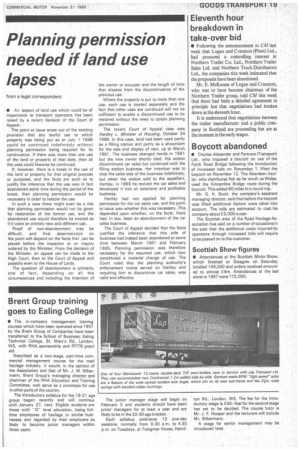Planning permission needed if land use lapses
Page 21

If you've noticed an error in this article please click here to report it so we can fix it.
from a legal correspondent
• An aspect of land use which could be of importance to transport operators has been raised by a recent decision of the Court of Appeal.
The point at issue arose out of the existing provision that any lawful use to which property was being put as at July 1 1948 could be continued indefinitely without planning permission being required for its continuance. If there was more than one use of the land or property at that date, then all the uses could likewise be continued.
If, however, there is a break in the use of the land or property for that original purpose or purposes, and the facts are such as to justify the inference that the use was in fact abandoned some time during the period of the break, then planning permission would be necessary in order to restore the use.
In such a case there might even be a risk that planning permission would not be given for restoration of the .former use, and the abandoned use would therefore be treated as if it were an entirely new and different use.
Proof of non-abandonment may be difficult, and final determination on the point will depend on the facts that can be placed before the inspector at an inquiry ordered by the Minister, From the decision of the Minister, an appeal can be made to the High Court, then to the Court of Appeal and possibly even to the House of Lords.
The question of abandonment is primarily one of fact, depending on all the circumstances and including the intention of the owner or occupier and the length of time that elapses from the discontinuance of the previous use.
Where the property is put to more than one use, each use is treated separately and the fact that other uses are continued will not he sufficient to enable a discontinued use to be restored without the need to obtain planning permission.
The recent Court of Appeal case was Hartley v. Minister of Housing, October 24 1969. In this case, land had been used partly as a filling station and partly as a showroom for the sale and display of cars, up to March 1961. The business changed hands in 1961 but the new owner shortly died. His widow discontinued car sales but continued with the filling station business. Her intention was to stop the sales side of the business indefinitely, but when the widow sold to the appellant, Hartley, in 1965 he revived the car sales and developed it into an extensive and profitable business.
Hartley had not applied for planning permission for the car sales use, and the point at issue was whether this was necessary. This depended upon whether, on the facts, there had, in law, been an abandonment of the car sales business.
The Court of Appeal decided that the facts justified the inference that this side of business had indeed been abandoned at some time between March 1961 and February 1965. Planning permission was therefore necessary for the resumed use, which now constituted a material change of use. The Court ruled that the planning authority's enforcement notice served on Hartley and requiring him to discontinue car sales, was valid and effective.




































































































